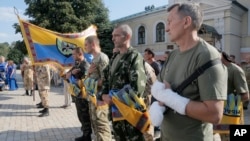Russia’s relations with the West are at a low point, a senior member of the U.S. Senate's Foreign Relations Committee said, due to Russia’s annexation of the Crimean peninsula one year ago and Moscow's continuing support for separatist rebels in Ukraine, especially in that country's eastern Donbas region.
Senator James Risch is one of a number of American lawmakers who have urged the U.S. government to begin supplying lethal weapons to the Ukrainian government as a deterrent against further Russian support for the rebels in eastern Ukraine.
In an interview with Voice of America’s Georgian Service, Risch said if the U.S. were to send weapons to Ukraine, it would give the country more influence in any future negotiations with the anti-Kyiv rebels or their Russian supporters.
“Ukrainians are not going to beat the Russians militarily," the Idaho senator told VOA. "There is no question about that."
Risch's assessment
Posing a hypothetical question to himself about how the conflict in Ukraine will end, the Republican lawmaker said, "It only ends with either a defeat militarily, which is unlikely; or with the Russians losing interest and going home, which is unlikely. The third way is simply a negotiated settlement, and that is how these things ordinarily end.
"I think that by the United States agreeing to give lethal assistance to the Ukrainians, hopefully that would give advantage to the Ukrainians, to some degree, with the Russians, when it comes to talking."
The people of Ukraine, Risch said, want to remain independent and maintain their own freedom.
"We, as Americans," he said, "are committed to the fact that we want to help people who are interested in doing that."
He said that is the basis of his commitment to increasing arms deliveries to Ukraine.
Maintaining sanctions
As for curtailing Moscow's aggressive policies in eastern Ukraine, the two-term senator said sanctions are the only viable tool for the West.
“The Russians are a large economy, and as a result of that most Russians are people who want to have a decent quality of life, and so sanctions do affect that," Risch told VOA's Georgian Service. "And I think that probably sanctions are about all you can look at in that regard. Certainly, neither the Russians nor the United States want any military confrontation between the two of them. Both know that is not a good thing and will not end well.”
Russia denounced the European Union last week for affirming that it will keep sanctions in place in an attempt to deter the Kremlin's moves in eastern Ukraine.
A Russian spokesman, Dmitry Peskov, said the European partners' decision was "destructive." He did not specify how Russia would respond, but said his government will "do what is in its national interests in terms of retaliatory sanctions."
Russian leaders past and present have recently increased the belligerent tone of their comments against NATO, the European Union and the United States, in contrast to an assurance by Anatoly Antonov, Russia's deputy defense minister, that Moscow is not seeking a confrontation with NATO, but favors instead “the development of cooperation."
Russia is “not going to attack anyone,” Antonov said in a news briefing for foreign defense attaches in Moscow on Saturday.
A former adviser to President Vladimir Putin and the Kremlin, Alexander Nekrassov, takes a more aggressive stand. From London, where he currently lives, Nekrassov posted a message on Twitter this week saying he feels that Russia should follow up its actions in Ukraine by declaring war on the Baltic states and Poland.
Russian belligerence
Russia's ambassador to Denmark, Mikhail Vanin, told the newspaper Jyllands-Posten on Saturday that Danish ships will become Russian targets if Denmark joins NATO’s missile-defense system.
The Danish foreign minister, Martin Lidegaard, responded quickly and angrily, saying that Vanin's comments had "crossed the line'' and were unacceptable diplomatic behavior.
The U.S. ambassador to Denmark, Rufus Gifford, tweeted that Vanin's comments "do not inspire confidence'' or contribute to peace and stability.
Lilia Shevtsova, a well-known expert on Kremlin affairs who is based in Washington, contends the crisis over Ukraine and Russia's actions, as well as the speculation over Putin's "disappearance" from public view recently, have caused some analysts to question Russia's political strength, and even begin thinking about "the post-Putin era."
Writing this month in The American Interest quarterly, Shevtsova said it appears the Russian system's final "agony" has begun. "It could be a nasty ride not just for Russia," she concludes, "but for the rest of the world as well."
VOA's Georgian Service contributed to this report.













